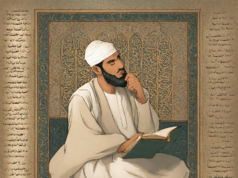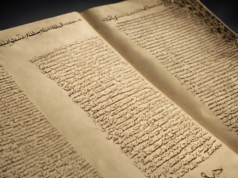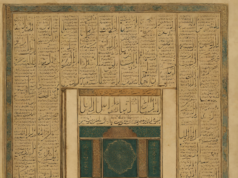
A study into both Quranic and other textual sources to determine if the Prophet(s) and the Aimmah (as) had been given knowledge of the unseen.
This article will cover the narrations and scholarly opinions, while Part 1 covers the Quranic evidences.
Let’s look at the views of some classical scholars and some narrations regarding this.
Views of some Classical Scholars about Ilm al Ghayb:
Scholarly Opinion 1: In his book, Kamal ud Deen, Sheikh Saduq says, on page 109 and 112:
“And whoever professes that “the occurrences become apparent to Allah (swt), through consideration and gained knowledge”, then such a person is a disbeliever (kafir) in Allah (swt). And what was other than this, then it is the belief of the Mughiriah sect, and anyone who attributes the knowledge of unseen (ghaib) to the Imams (as), then that is an act of disbelief (Kufr) in Allah (swt) and a departure from Islam according to us.” (Kamal ud Deen, Saduq, Pg 109)
And in another place, on page 112, he says:
“…Also, the Imam was not aware of these confusing and contradictory claims that were transmitted by the narrators of Hadith because he does not know the unseen, rather he is just a pious slave of Allah (swt) who knows the Quran and Sunnah, and he only knows about those affairs of his shias which are reported to him” (Kamal ud Deen, Saduq, Pg 112)


… anyone who attributes the knowledge of unseen (ghaib) to the Imams (as), then that is an act of disbelief (Kufr) in Allah (swt) and a departure from Islam according to us.
Sheikh Saduq, Kamal ud Deen, Pg 109 & Pg 112.
Scholarly Opinion 1: In the book Masail al Ukbariya, Shaikh Mufid (413 AH) was asked(Page 69-72, question number 20):
“There is a consensus among us Shias that the Imam knows what is going to happen, so what was wrong with Imam Ali (as) that he still proceeded to the mosque despite knowing that he would be killed, as well as knowing his killer and the time of his death.And similarly what was wrong with Imam Hussain (as) that he also proceeded to Kufa despite knowing that they will let him down and will not help him, and that he would be killed in this travel. And why is it that when him and his companions were cornered at Karbala, and while he knew that they would be denied access to water, if he had dug into the ground even for about an arm’s length he would have struck water but despite that he did not dig for water to support himself and got martyred thirsty. And why did Imam al Hasan (as) enter into a promise with Muawiyah and made peace despite knowing that he would break the promise, not prove faithful and kill the shias of his father.”
So Shaikh Mufid replied to this claim about the Imam knowing the future:
“The consensus of the Shia scholars is the opposite of that, and Shia scholars have never consented upon this notion that the Imams know the future.”


“The consensus of the Shia scholars is the opposite of that, and Shia scholars have never consented upon this notion that the Imams know the future.”
Al Masail Al Ukbariya, Sheikh Mufeed, pg 69
Scholarly Opinion 3: In his book “Al Awail al Maqalaat”, Sheikh Mufeed writes:
“As for saying that the Imams know ghaib, so it is an extremely evil and corrupt belief….”


Scholarly Opinion 4: Shaikh Tusi wrote in his book Talkhis al Shafi (Volume 1 page 252):
“…We do not consider it necessary for the Imam to have any knowledge of things which is not directly related to Islamic laws….”


“…We do not consider it necessary for the Imam to have any knowledge of things which is not directly related to Islamic laws….”
Sheikh Toosi, Talkhis al Shafi, Pg 252
Scholarly Opinion 5: In Majma ul Bayan, which is one of the most popular Shia Tafseer of Quran, Allama Tabarsi writes for the commentary of this verse (Surah al Hud Verse 123) “And for Allah is the knowledge of ghaib of the skies and the earth”:
“We do not know of any Shia scholar who permits attributing the knowledge of ghaib to any of the makhlooq (creatures) for the only one who is worthy of being characterized by such an attribute is the one who possesses all knowledge without acquisition. And this is true only for Allah whose knowledge is eternal and He knows everything by Himself (without acquiring it from any source). None is a partner of Him in this attribute and whoever believes that anyone other than Allah knows ghaib then he is outside the fold of Islam. Now as for what has been narrated by the Shias and non Shias among the ahadith of Imam Ali where he mentions some events which would take place in the future, so all that knowledge is what he inherited from the Prophet who in turn was informed by Allah (about some limited future events). So those ahadith do not at all mean that the Imams have knowledge of ghaib.”


Scholarly Opinion 6: Ibn Shahr Ashoob writes in his book, Mutashabih Al Quran:
“The Prophet and the Imam must have full knowledge of the Islamic laws, but it is not necessary upon them to have knowledge of ghaib, after all that would then mean that they are partners of Allah.”


Narrations of Imams of Ahlulbayt (as) about Ilm al Ghayb:
Narration 1: In a Sahih Narration, in Amali Sheikh Mufeed:
Yahya b. Abdullah b. al-Hasan and I were with Abul Hasan (Imam Ridha a.s), peace be upon him, and Yahya asked him: “May I be your ransom, they think that you have the knowledge of the unseen (Ilmul Ghaib).” He said: “Glory be to Allah! Place your hand over my head. For, By Allah, there does not remain a hair on my head and on my body except that it stood up (Goosebumps). Then he said: “No, By Allah, it is nothing but what we have inherited from the Prophet (peace be upon him and his progeny).”


The same Sahih narration has been mentioned in Rijal al Kashi:


Narration 2: In another Sahih narration in Rijal Kashi:
It is narrated from Ibn Abi Umair, from shu’aib, from Abi Baseer, who said: I said to Abi Abdullah (Imam Sadiq a.s) “Indeed they claim!!!” Imams (as) asked: “And what do they claim?” I said “They claim that you know the (number of the) drops of the rain, and the number of stars and (the number of) leaves on trees, and the weight of what is in the seas and number of (the particles in the) sand.
So the Imam (as) raised his hand towards the sky and said: “Subhanallah! Subhanallah! No one knows all this except for Allah (swt)”


Narration 3: In Nahj balagha, in Sermon 128, Imam Ali (as) discloses some events of the future, so one of the companions said to him: O Amir al-mu’minin, you have been given (Ilm al Ghayb) knowledge of hidden things. Whereupon Amir al-mu’minin laughed and said to the man who belonged to the tribe of Banu Kalb:
O brother of Kalb! This is not knowledge of hidden things (`ilmu’l-ghayb), these matters have been acquired from him (the Prophet) who knew them. As regard knowledge of hidden things, that includes knowledge of the Day of Judgment, and the things covered by Allah in the verse: “Verily, Allah is He with Whom is the knowledge of the Hour; He sends down the rain, and He knows what is in the wombs. No soul knows what it will earn tomorrow, and no soul knows in what land it will die..” (Qur’an, 31:34)
Therefore, Allah alone knows what is there in the wombs, whether male or female, ugly or handsome, generous or miserly, mischievous or pious, and who will be the fuel for Hell and who will be in the company of the Prophets in Paradise. This is the knowledge of the hidden things which is not known to anyone save Allah. All else (that we know) is that whose knowledge Allah passed on to His Prophet and he passed it on to me, and prayed for me that my bosom may retain it and my ribs may hold it.
This shows that whenever the Imams (as) said something about specific future events, it was not due to Ilm al Ghayb, but rather due to what had been narrated by Rasulallah (s) who in turn received it from Allah (swt).
Narration 4: In letter 43 of Nahjul Balagha, which Imam Ali (as) write to Masqalah ibn Hubayrah ash-Shaybani, the Governor of Ardashir Khurrah (Iran). Imam Ali (as) says:
I have come to know concerning you a matter which if you have done it you have displeased your Allah and disobeyed your Imam. You are distributing among the Arabs (Bedouins) of your kin who tend towards you the property of the Muslims which they collected by dint of their spears and horses and on which their blood was shed….
If Imam Ali (as) was regularly presented with the deeds of all the people, why does the Imam (as) say “I have come to know concerning you a matter which if you have done it you have displeased your Allah and disobeyed your Imam.”
Shouldn’t the Imam (as) be sure about what this person had been doing? If we read most of the sermons and letters of Imams (as), and read their lives, they seem to be normal human beings, not super natural beings with extraordinary powers and capabilities.
Narration 5: In a letter in Nahjul Balagha, which Imam Ali (as) sent to Munzir ibn Jarud Abdi:
The fact is that piety, honesty and righteousness of your father made me misjudge your character. I thought you were a worthy son of a worthy father and were following him in his honesty and righteousness. But all of a sudden I received about you news which confirms the fact that you do not check and control your inordinate desires, that you do not attach any importance to your life after death and you want to adorn and beautify your life at the cost of your salvation and that you are forsaking your religion to provide for your relatives.
If all that is reported to me about you is correct, then the very camel you own or even the strap-shoe is superior to you. You and men of your caliber are not the persons to be confided with the financial affairs of a country or to be assigned to important vacancies of the State or to be entrusted to check and control dishonesty and disloyalty. Therefore, as soon as you receive this letter come back to me.
As we can see, Imam Ali (as) did not have knowledge about the character of Munzir ibn Jarud, and hence he misjudged his character. Also, further the Imam (as) says, “If all that is reported to me about you is correct”, which means that Imam (as) is open to the possibility that he may have received faulty reports.
This shows that the Imams (as) were regular human beings, and judged and made decisions based on the information available to them, just as we all do. Furthermore, if the Imams (as) had Ilm al Ghayb, i.e knowledge of every minute detail of the universe, knowledge of the past and future, then how can they be role models for us?
If we assume this kind of knowledge for them, then there is no lesson for us in the incidents where the Imams (as) controlled their anger and replied politely in the face of insults and humiliation from the enemy, because anyone can prepare and control himself if he knows what’s going to happen, the real test is when you have no idea and out of nowhere someone comes and starts abusing you, and in that moment you control your anger.
Also, if we assume this kind of knowledge for the Imams (as), then there would be no virtue for Imam Ali (as) to have slept on the bed of the Prophet (saww) on the night of hijra, because anybody could do that if they were sure that they won’t be harmed, but the virtue of Imam Ali (as) lies in the fact that he did not know if he would wake up the next morning or he would be killed, and yet he slept on the bed of the Prophet (s) to save the Prophet’s life.
So those who claim these supernatural powers and supernatural knowledge for the Imams (as) to raise their status, in reality degrade their status as role models that we can emulate, and make it seem impossible for us to take human lessons from the Imams (as).
Therefore, just as the Imams have done on this issue, we should reject the fabricated incidents that attribute Ilm al Ghayb to the Imams (as). Like the incident where Imam Ali (as) says that I never kill a person in battle until I have seen that there is no believer in his next seven generations. These kinds of incidents totally contradict the Quran and narrations of Ahlulbayt (as), as we have seen above.
Appreciation: Thank you to the Shia Reformist website for sharing some of its resources with Al-Islaah.org to publish on this website.





